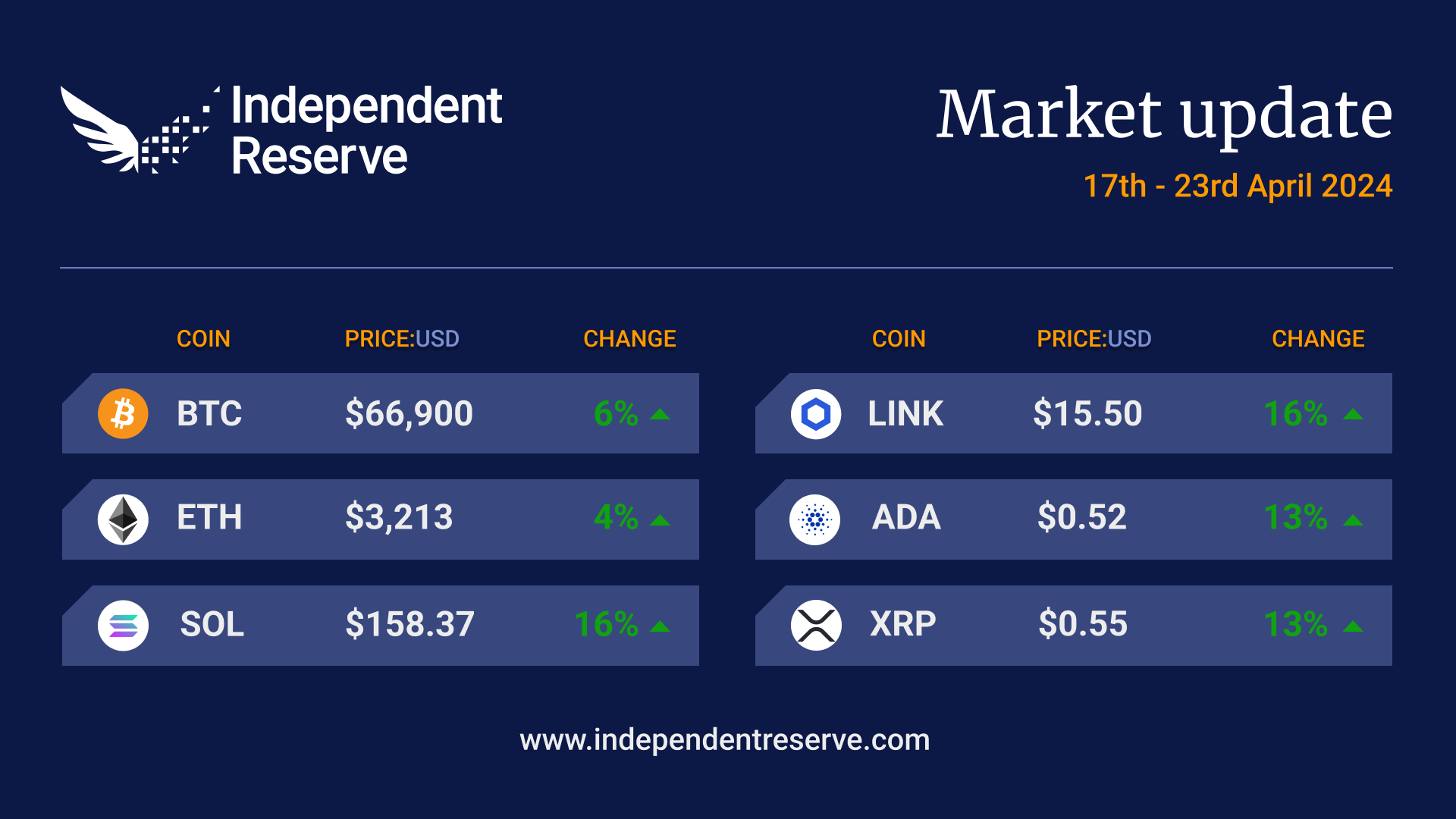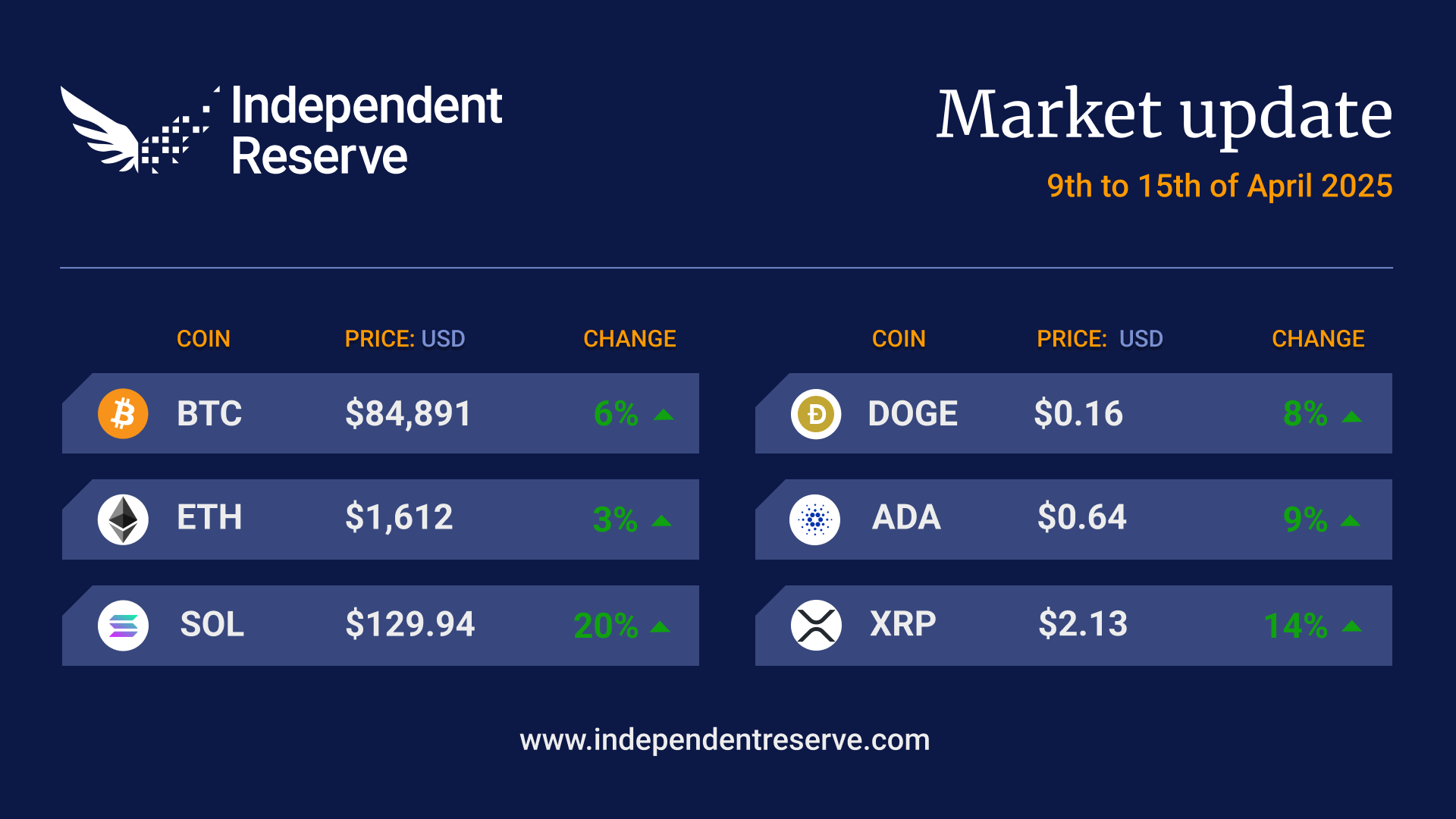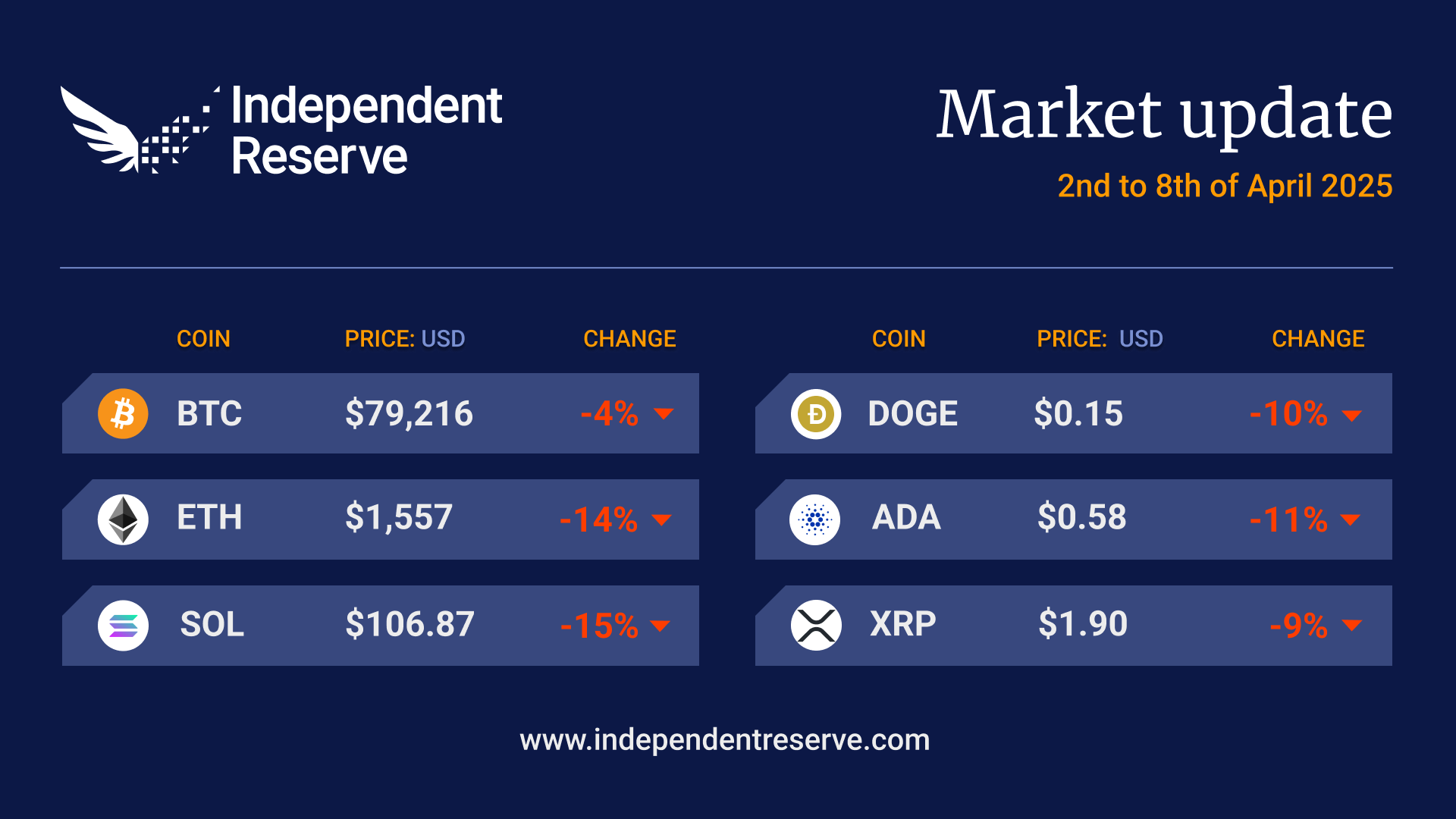In Markets
This week saw another mini crypto crash, with Bitcoin dropping to around A$94K (US$60K) as Israel struck back after Iran’s attack. However, prices recovered, and it became clear Iran did not want to escalate further. The region remains on a knife edge, though, with any escalation able to turn markets on a dime. Traditional markets were also hit, with concerns that the conflict would pump energy prices, which would hit interest rates and inflation. Bitcoin finishes the week up 6% to trade around A$103,455 (US$66,900) in the wake of Saturday’s halving, while Ethereum gained 4% to trade at A$4,967 (US$3,213). Everything else was up, including Solana (16%), XRP (13%), Dogecoin (1.1%), Cardano (13%) and Shiba Inu (24%). The Crypto Fear and Greed Index is at 73 or Greed.

In Headlines
The Bitcoin halving
The much-anticipated Bitcoin halving occurred on Saturday morning AEST, with the Bitcoin block reward dropping from 6.25 BTC down to 3.125 BTC. The event happens once every four years, or 210,000 blocks. While historically quite bullish, in the short term, it slashes revenue from the block reward for Bitcoin miners, incentivising them to sell inventory. 10x Research analyst Markus Thielen believes miners could liquidate around US$5 billion (A$7.75B) in Bitcoin over the next few months, resulting in sideways price action. After the last halving, Bitcoin got stuck around US$10K for five months. So, where to next? FundStrat co-founder Tom Lee says Bitcoin will definitely hit a new all-time high this year, with US$150K (A$233K) “probable” by year’s end. If the cycle mirrors historical increases, the price could hit US$270K to US$450K (A$419K to $698K) within one year, with Noelle Acheson from the Crypto Is Macro Now newsletter stating that US$1.8M (A$2.79M) was possible! But this time really is different, with Bitcoin hitting a new ATH before the Halving for the first time, a 400% increase in users since 2020, and elevated interest rates. The old models may no longer be much of a guide.
Bitcoin revenue skyrockets after halving
Fees on Bitcoin went crazy around the halving due to Ordinals NFTs and the launch of a new fungible token protocol called Runes from the creator of Ordinals. Miners have actually been making more money since the halving than before, taking in 860.2 BTC worth US$54 million (A$83.7M) in transaction revenue in the first 60 blocks. All of Bitcoin’s top 10 most valuable blocks, bar one, have been created since the halving. Part of the gold rush was users trying to claim ultra rare ‘epic sats’ Ordinals. Merely ‘rare sats’ (100 times more frequent) have sold for as much as US$100,000 (A$155K)
Bitcoin looking good
Bitcoin is in good shape following the halving. Bitcoin News reports the market value to realised value (MVRV) ratio has dipped below its 90-day average again, which has been associated with an average gain of 67%. Crypto Briefing reports that a daily average of 374 Bitcoins was sent from miners to exchanges over the past month, down from 1300 a day in February, suggesting “miners sold their Bitcoin reserves ahead of the halving, distributing potential selling pressure over a longer period and avoiding a sharp market drop.” The average Bitcoin production cost (mostly electricity) post-halving is around US$53K (A$82K), with Coinshares tipping some miners will shift to AI instead.
Mt Gox dump?
According to reports, customers of Mt Gox are set to receive 142,000 Bitcoin and 143,000 Bitcoin Cash by October this year. Mt Gox was the first Bitcoin exchange, but collapsed after losing 850K Bitcoin to a security breach in 2014.
Stablecoin bill
US Senators Kirsten Gillibrand and Cynthia Lummis have introduced a new Payment Stablecoin Act into the US Senate. The bill introduces clear regulations for issuers, ensuring they have 1 to 1 backing for their tokens, bans algorithmic stablecoins and takes aim at money laundering.
SEC lawyers ‘thrown under the bus’
Two SEC lawyers have been forced to resign after a district court last month sanctioned the regulator for acting in “bad faith” and showing a “gross abuse of power” during a crypto lawsuit against DEBT Box. The lawyers had only been with the SEC for 18 months, leading to suggestions they were thrown under the bus as scapegoats for the SEC’s bad behaviour. Crypto lawyer MetaLawMan said the court determined the SEC’s behaviour was not caused by two bad apples, but there was “pervasive misconduct [demonstrating] a pattern of organisational bad faith and broadly implicates the Commission itself.”
Bitcoin ETFs steady
The Bitcoin ETFs saw only one net inflow day last week, and looking at the chart, they’ve been stuck around the US$12 billion (A$18.6B) assets under management mark for more than a month. However, that’s still a massive success, according to Bloomberg ETF analyst Eric Balchunas, who also notes that BlackRock’s IBIT has seen inflows for 69 days in a row. Grayscale has lost about half its Bitcoin Trust since the launch of the Bitcoin ETFs, primarily due to its extremely high fees. It’s now launching a Bitcoin Mini Trust, which has the lowest fees of any ETF at 0.15% under the BTC ticker.
Crypto ETFs in South Korea, Singapore and Japan next?
Karim Saber, a research associate at crypto ETP issuer 21Shares, expects Singapore, South Korea and Japan to follow the US and Hong Kong in approving Bitcoin ETFs in the next 12 months. In South Korea, the Bitcoin ETF-friendly Democratic Party won a majority of seats in the April 10 election. Saber also noted that the Government Pension Investment Fund in Japan is considering investing in Bitcoin. He highlighted Independent Reserve’s survey of Singaporeans, which showed that one-third would consider investing in overseas ETFs. “Therefore, we anticipate Singapore and Japan to increasingly pursue regulatory approval following South Korea,” he added. “The approval in Hong Kong could catalyse discussions this year as Asian countries vie for prominence as the next financial center for innovation.” However, the Monetary Authority of Singapore has expressed concerns about retail access to crypto ETFs.
Until next week Happy Trading!


